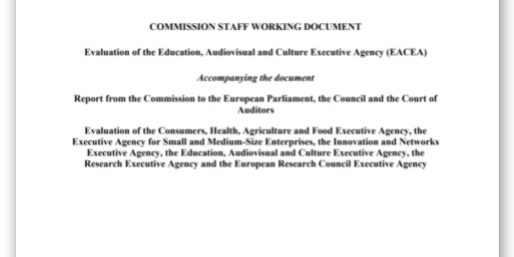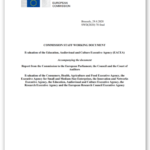
The purpose of this evaluation is the periodical (triennial) evaluation of the operation of the Education, Audiovisual and Culture Executive Agency (hereinafter EACEA). The EACEA is governed by:
The Framework Regulation for executive agencies 1;
EACEA Act of Establishment 2, which sets out its mandate;
EACEA Act of Delegation 3 and its successive amendments, specifying the tasks to be carried out by, and the powers delegated to, the Agency in order to perform its mandate;
The decision appointing the members of the EACEA Steering Committee4.
In line with the Commission’s better regulation principles5, the evaluation applies several standard evaluation criteria. The evaluation assesses whether the Agency has fulfilled its tasks in an effective and efficient way, whether there are overlaps / gaps / inconsistencies in the management of the programme portfolio by the Agency, and whether there is a clear delineation of tasks between EACEA and the parent DGs (coherence).
The evaluation assesses whether the functioning of the Agency has yielded the expected positive results as estimated in the cost-benefit analysis for delegating task to the Agency6 and identifies potential areas of improvement. To this end, the estimations of the cost-benefit analysis of 2013 have been tested to provide evidence on the validity of the assumptions made in the ex ante scenario by considering the actual costs and benefits of programme implementation by the Agency in a structured way. The aspects to be covered by the cost-benefit analysis are specified in Article 3(1) of the Framework Regulation7 and the Guidelines on establishing and operating executive agencies8.
The evaluation does not cover the achievements of the programmes managed by EACEA, which are subject to mid-term and ex post evaluations themselves. The evaluation of EACEA nevertheless provides useful input for these programme evaluations, considering that the
performance of the Agency has an impact on the efficiency and effectiveness of the programmes it manages.
- The evaluation examines the efficient use of resources and the effective achievement of the tasks entrusted to it. In particular, it looks at whether:
- The alignment of programme portfolios with the Agency’s core competences and its brand identity delivered the estimated qualitative benefits;
- The assembly of the management of different EU programmes delivered the estimated synergies, simplification and economies of scale;
- The pooling of instruments guaranteed consistent service delivery;
There is scope for simplification and further efficiency gains.
This evaluation – the fourth one since the establishment of EACEA – covers the period 2015-2017. The evaluation is supported by a study carried out by an external contractor9.
The results of this study are summarised hereafter and this evaluation will be presented to the European Parliament, to the Council and to the Court of Auditors in accordance with Article 25(1) of the Framework Regulation.
The results will feed into the reflection to assess the opportunity of expanding/ modifying the Agency’s mandate in view of the delegation of the implementation of 2021-2027 EU programmes.
SWD(2020) 78 final COMMISSION STAFF WORKING DOCUMENT eacea evaluation
